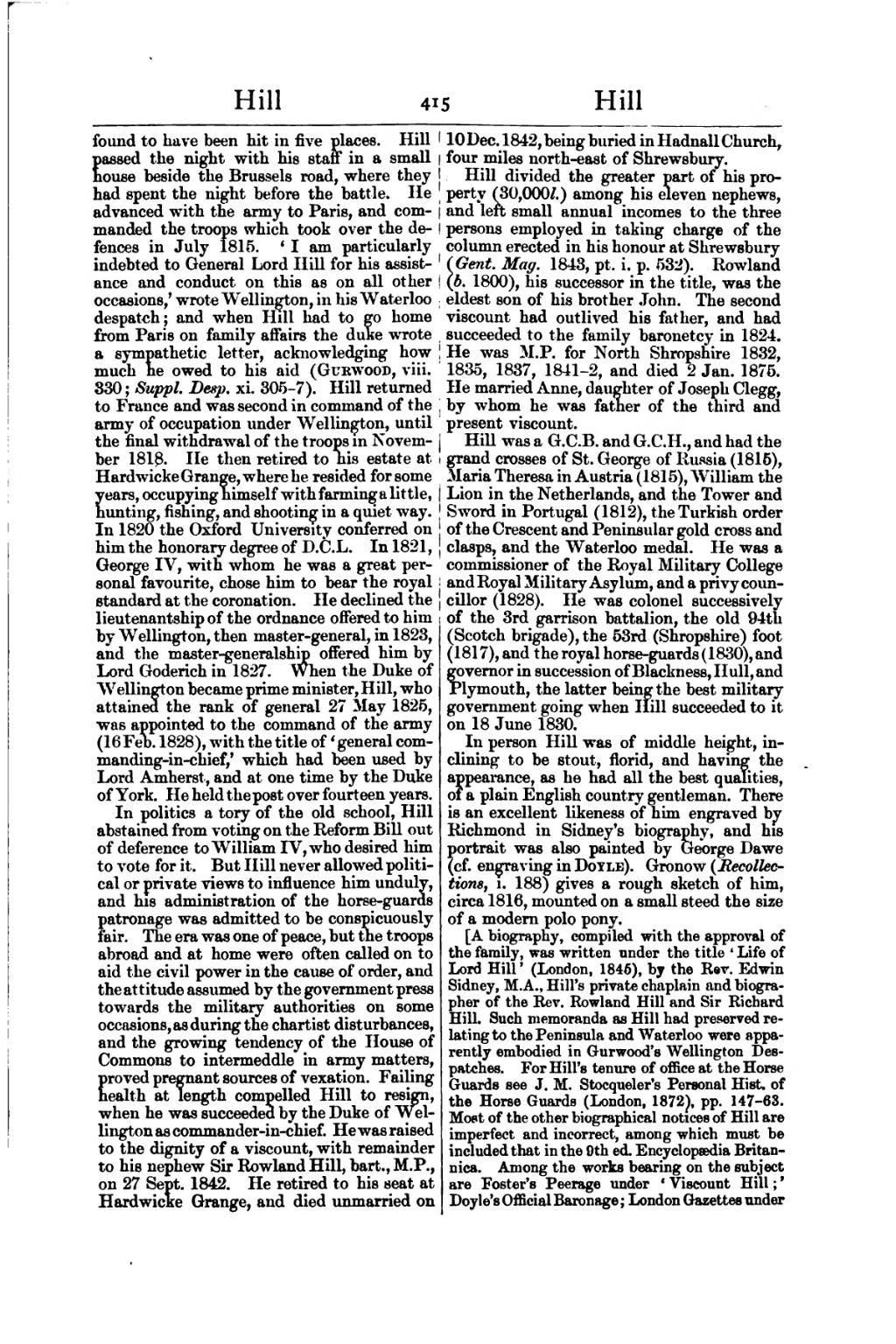found to have been hit in five places. Hill passed the night with his staff in a small house beside the Brussels road, where they had spent the night before the battle. He advanced with the army to Paris, and commanded the troops which took over the defences in July 1815. ‘I am particularly indebted to General Lord Hill for his assistance and conduct on this as on all other occasions,’ wrote Wellington, in his Waterloo despatch; and when Hill had to go home from Paris on family affairs the duke wrote a sympathetic letter, acknowledging how much he owed to his aid (Gurwood, viii. 330; Suppl. Desp. xi. 305–7). Hill returned to France and was second in command of the army of occupation under Wellington, until the final withdrawal of the troops in November 1818. He then retired to his estate at Hardwicke Grange, where he resided for some years, occupying himself with farming a little, hunting, fishing, and shooting in a quiet way. In 1820 the Oxford University conferred on him the honorary degree of D.C.L. In 1821, George IV, with whom he was a great personal favourite, chose him to bear the royal standard at the coronation. He declined the lieutenantship of the ordnance offered to him by Wellington, then master-general, in 1823, and the master-generalship offered him by Lord Goderich in 1827. When the Duke of Wellington became prime minister, Hill, who attained the rank of general 27 May 1825, was appointed to the command of the army (16 Feb. 1828), with the title of ‘general commanding-in-chief,’ which had been used by Lord Amherst, and at one time by the Duke of York. He held the post over fourteen years.
In politics a tory of the old school, Hill abstained from voting on the Reform Bill out of deference to William IV, who desired him to vote for it. But Hill never allowed political or private views to influence him unduly, and his administration of the horse-guards patronage was admitted to be conspicuously fair. The era was one of peace, but the troops abroad and at home were often called on to aid the civil power in the cause of order, and the attitude assumed by the government press towards the military authorities on some occasions, as during the chartist disturbances, and the growing tendency of the House of Commons to intermeddle in army matters, proved pregnant sources of vexation. Failing health at length compelled Hill to resign, when he was succeeded by the Duke of Wellington as commander-in-chief. He was raised to the dignity of a viscount, with remainder to his nephew Sir Rowland Hill, bart., M.P., on 27 Sept. 1842. He retired to his seat at Hardwicke Grange, and died unmarried on 10 Dec. 1842, being buried in Hadnall Church, four miles north-east of Shrewsbury.
Hill divided the greater part of his property (30,000l.) among his eleven nephews, and left small annual incomes to the three persons employed in taking charge of the column erected in his honour at Shrewsbury (Gent. Mag. 1843, pt. i. p. 532). Rowland (b. 1800), his successor in the title, was the eldest son of his brother John. The second viscount had outlived his father, and had succeeded to the family baronetcy in 1824. He was M.P. for North Shropshire 1832, 1835, 1837, 1841–2, and died 2 Jan. 1875. He married Anne, daughter of Joseph Clegg, by whom he was father of the third and present viscount.
Hill was a G.C.B. and G.C.H., and had the grand crosses of St. George of Russia (1815), Maria Theresa in Austria (1815), William the Lion in the Netherlands, and the Tower and Sword in Portugal (1812), the Turkish order of the Crescent and Peninsular gold cross and clasps, and the Waterloo medal. He was a commissioner of the Royal Military College and Royal Military Asylum, and a privy councillor (1828). He was colonel successively of the 3rd garrison battalion, the old 94th (Scotch brigade), the 53rd (Shropshire) foot (1817), and the royal horse-guards (1830), and governor in succession of Blackness, Hull, and Plymouth, the latter being the best military government going when Hill succeeded to it on 18 June 1830.
In person Hill was of middle height, inclining to be stout, florid, and having the appearance, as he had all the best qualities, of a plain English country gentleman. There is an excellent likeness of him engraved by Richmond in Sidney's biography, and his portrait was also painted by George Dawe (cf. engraving in Doyle). Gronow (Recollections, i. 188) gives a rough sketch of him, circa 1816, mounted on a small steed the size of a modern polo pony.
